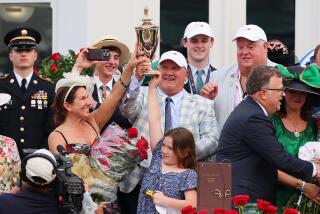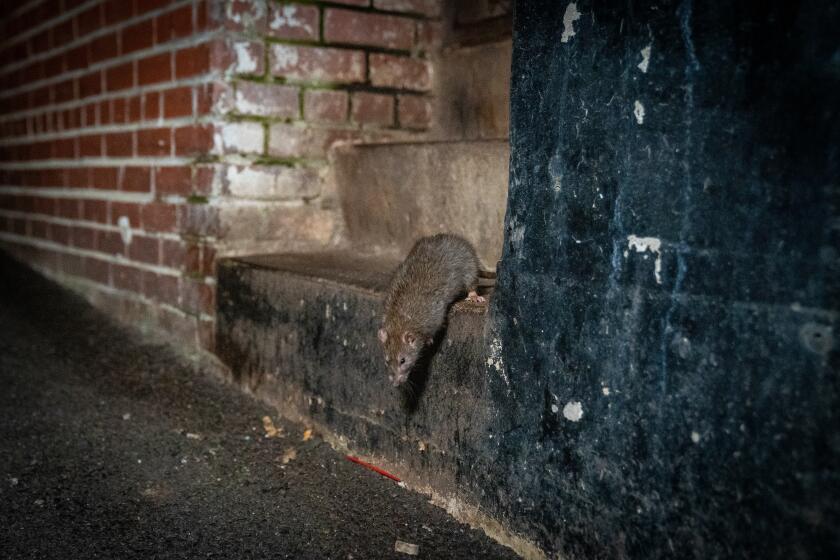Nobility Is Not Always Infallibility
- Share via
It is called the sport of kings because it is run by the last set of people on this earth who believe in heredity and aristocracy and all that jazz that the Hapsburgs and Hohenzollerns and czars and archdukes believed in and we thought had died out with Queen Victoria and the Kaiser.
The divine right of kings became an outmoded fancy in the rest of society, royalty became doormen but the stubborn belief in an aristocracy still perseveres around the horsy set.
Watch them at an auction as a yearling is led in whose family is the right sort, right out of the horses’ Burke’s Peerage or Almanach de Gotha, an equine archduke, a four-legged crown prince whose dam would wear a lorgnette if she were human and whose sire would wear a monocle and carry a gold cane.
A film comes over their eyes. They begin to pant, hyperventilate. It’s like a garden party when the Duchess of Kent walks in.
They throw caution to the winds. They begin shouting bids in the millions. They lock checkbooks with the Maharanee of Ingore or the Sheik of Dubai.
David Harum would be astounded. Two years ago at Keeneland, the bidding didn’t stop till it reached $13.1 million. That’s for a horse, not a coal mine or a railroad or an oil well. The horse’s name was Seattle Dancer. Ever hear of him? Neither have I.
It is the conceit of horse breeders that they can crank out champion race horses by the stableful merely by the selective process of seeing to it that only the finest families mate with each other.
History should tell them it never works. Royal families in history produced only neurasthenics, schizophrenics, hemophiliacs, coxcombs in crowns. Precocity is not transferable. Genes are too tricky. You start out with Richard the Lion Hearted and you end up with the Duke of Windsor.
Why should horses be any different? Consider there have been 112 Kentucky Derby winners in track history. Only 11 of them have sired Derby winners themselves. Citation may have been one of the best race horses you or I will ever see. But don’t look for his tribe in the winner’s circle. He never could reproduce himself.
None of this deters in the slightest the bidders at the horse auctions. Parade a foal with a famous name in the ring and people who would shy at buying Park Avenue real estate suddenly start emptying their bank accounts and borrowing more.
You wonder why. Whatever becomes of those $13-million beauties? How come races--even the classics--are being won by moderately priced horses, even bargains, who don’t have the breeding to do it, just the guts?
You take this Saturday’s Santa Anita Derby, a traditional steppingstone to the Kentucky Derby--five Santa Anita Derby winners have won it.
You know how much the favorite for this week’s Santa Anita Derby cost? Five-thousand five-hundred dollars.
As a matter of fact, Masterful Advocate might even have cost less if Joe Manzi had caught the plane he was supposed to catch that fall afternoon in Lexington, Ky., a couple of years ago.
The fall sales at Keeneland are kind of like the white sales after Christmas. The merchandise that didn’t go in the holiday shopping gets put on the shelves marked down. In the case of Keeneland, this means that the salable stuff goes in the summer sales.
This doesn’t always mean that the fall crop is second rate. It just means that horsemen, as usual, make mistakes. Spectacular Bid, as good a horse as has run in the last 25 years, was turned down by the summer sales. His breeding was not commanding enough. He went in the fall sales and brought only $37,000.
Spectacular Bid is only the fifth-leading money winner of all-time with $2,781,000 won, to say nothing of the millions at stud.
There was nothing to indicate that Masterful Advocate didn’t belong in the rummage sale. His sire, Torsion, was not a statue in anybody’s paddock, but something about him caught Joe Manzi’s eye that afternoon between planes at Lexington.
Joe is a trainer who learned his craft under Charlie Whittingham and he could hardly believe the colt was being shopped around like something on an irregular shelf.
“He was a grand looking individual,” Manzi said. “He looked like a runner. I was just killing some time, and the auction was right across the street from the airport. I didn’t exactly intend to buy him. I couldn’t believe he went so cheaply, the way he looked.
“So, I went around to the barns, I thought there must be something wrong with him. I couldn’t fault him at all. I checked the pedigree, he was out of a Gray Dawn mare and by a Never Bend colt so I knew he had to be able to run some.”
Run some, Masterful Advocate could. He won the first race Manzi put him in, then went to Golden Gate and, even green, finished second in a stakes. He won an allowance by 7 1/2 lengths, no less, and the trainer knew he had a quality horse when he finished only two necks out in the Hollywood Futurity behind star power horses like Whittingham’s Temperate Sil and the regally bred Alysheba.
Masterful Advocate has won every race he’s run this year, including one over the highly regarded Talinum, whom he chased clear to Florida.
He has earned $436,425 and his trip to Kentucky, unless something terrible happens Saturday.
It’s not a Cinderella story. It happens all the time on race tracks. Seattle Slew cost only $17,500. All he did was win the Triple Crown. Now, his reputation is such that his half-brother brought $13 million at the Keeneland summer sale two years ago.
A year before that, the same bidders, a British bookie and an oil sheik, had bid $10.2 million for a colt that never got on a race track.
It’s a crapshoot. It might be the sport of kings, but, like all sports, it’s best played by commoners. The winners come from the servants’ quarters, the tradesmen’s entrance.
More to Read
Sign up for Essential California
The most important California stories and recommendations in your inbox every morning.
You may occasionally receive promotional content from the Los Angeles Times.










